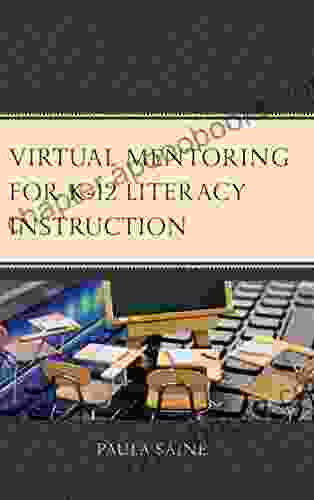Unlock Literacy Success with Virtual Mentoring: A Comprehensive Guide for Elementary Teachers

In today's rapidly evolving educational landscape, virtual mentoring has emerged as a powerful tool for enhancing literacy instruction in elementary classrooms. By connecting students with experienced literacy professionals from diverse backgrounds, virtual mentoring provides a unique opportunity to individualize learning, foster collaboration, and inspire a lifelong love of reading and writing.
5 out of 5
| Language | : | English |
| File size | : | 5296 KB |
| Text-to-Speech | : | Enabled |
| Screen Reader | : | Supported |
| Enhanced typesetting | : | Enabled |
| Word Wise | : | Enabled |
| Print length | : | 172 pages |
This comprehensive guide will delve into the transformative potential of virtual mentoring for elementary literacy instruction. We will explore practical strategies, case studies, and resources to help educators create engaging and effective virtual learning experiences that foster literacy development.
Benefits of Virtual Mentoring for Literacy Instruction
- Personalized Learning: Virtual mentors can tailor their guidance to meet the individual needs of each student, providing targeted support in areas where they need it most.
- Expanded Perspectives: Students are exposed to a variety of perspectives and experiences through their virtual mentors, broadening their understanding of literacy concepts and applications.
- Increased Student Engagement: Virtual mentoring provides students with a sense of connection and support that can enhance their motivation and engagement in literacy activities.
- Improved Literacy Skills: Studies have shown that virtual mentoring can lead to significant gains in reading and writing proficiency, particularly for students who are struggling or at-risk.
- Teacher Collaboration: Virtual mentoring fosters collaboration between teachers and mentors, allowing them to share best practices and develop innovative instructional strategies.
Effective Implementation of Virtual Mentoring
To maximize the benefits of virtual mentoring, it is essential to implement it effectively. Here are some key considerations:
Matching Mentors and Students
Matching mentors and students based on their needs, interests, and learning styles is crucial for successful virtual mentoring relationships. Consider the following factors:
- Literacy Skills: Assess students' strengths and areas for improvement to match them with mentors who can provide targeted support.
- Learning Styles: Identify students' preferred learning modalities and match them with mentors who can engage them effectively.
- Interests: Explore students' interests outside of literacy to find mentors who can connect with them and motivate them.
Establishing a Collaborative Environment
Create a collaborative environment where students, mentors, and teachers work together to support student learning. Encourage open communication and regular feedback to ensure that everyone is on the same page.
Use a variety of communication tools, such as video conferencing, email, and discussion boards, to facilitate interaction and collaboration.
Setting Clear Expectations
Establish clear expectations for all participants involved in the virtual mentoring program. This includes defining the roles and responsibilities of mentors, students, and teachers.
Set specific goals for each mentoring relationship and develop a plan for monitoring progress and making adjustments as needed.
Providing Ongoing Support
Provide ongoing support and professional development opportunities for both mentors and teachers. This will ensure that they have the necessary skills and resources to facilitate effective virtual mentoring.
Create a supportive network where mentors and teachers can connect, share experiences, and learn from each other.
Case Studies: Virtual Mentoring in Action
Let's explore two case studies that demonstrate the transformative impact of virtual mentoring on elementary literacy instruction:
Case Study 1: Virtual Mentoring for Reading Intervention
In a rural school district, a virtual mentoring program was implemented to provide reading intervention support to struggling third graders. Each student was matched with a trained literacy tutor who met with them weekly via video conferencing.
The mentors used evidence-based reading strategies to address the students' specific needs, such as phonemic awareness, fluency, and comprehension. Students showed significant gains in their reading skills, with many transitioning out of intervention within a year.

Case Study 2: Virtual Mentoring for Writing Enrichment
In an urban school district, a virtual mentoring program was created to provide writing enrichment opportunities to gifted fourth and fifth graders. Each student was paired with an experienced author or writing coach.
The mentors worked with students to develop their writing skills, explore different genres, and publish their work in online magazines and anthologies. Students developed a passion for writing and gained valuable insights into the writing process.

Resources for Virtual Mentoring
To help educators implement virtual mentoring programs in their classrooms, we have compiled a list of valuable resources:
- National Virtual Mentoring Coalition: A non-profit organization that provides resources and support for virtual mentoring programs.
- Mentoring America: A national organization that promotes youth mentoring and provides training and resources for mentors.
- Virtual Volunteers: A platform that connects volunteers with virtual mentoring opportunities.
- Ready to Read: A program that provides virtual tutoring support to young children.
- School Toolbox: A website that provides practical tips and resources for virtual mentoring in K-12 education.
Virtual mentoring has the potential to revolutionize literacy instruction in elementary classrooms. By providing students with individualized support, expanding their perspectives, and fostering a love of learning, virtual mentoring can empower educators to create engaging and effective literacy experiences that lead to lasting success.
As we navigate the challenges and opportunities of the 21st century, embracing virtual mentoring is essential to ensure that all students have the literacy skills they need to thrive in an ever-changing world.
5 out of 5
| Language | : | English |
| File size | : | 5296 KB |
| Text-to-Speech | : | Enabled |
| Screen Reader | : | Supported |
| Enhanced typesetting | : | Enabled |
| Word Wise | : | Enabled |
| Print length | : | 172 pages |
Do you want to contribute by writing guest posts on this blog?
Please contact us and send us a resume of previous articles that you have written.
 Book
Book Novel
Novel Page
Page Chapter
Chapter Text
Text Story
Story Genre
Genre Reader
Reader Library
Library Paperback
Paperback E-book
E-book Magazine
Magazine Newspaper
Newspaper Paragraph
Paragraph Sentence
Sentence Bookmark
Bookmark Shelf
Shelf Glossary
Glossary Bibliography
Bibliography Foreword
Foreword Preface
Preface Synopsis
Synopsis Annotation
Annotation Footnote
Footnote Manuscript
Manuscript Scroll
Scroll Codex
Codex Tome
Tome Bestseller
Bestseller Classics
Classics Library card
Library card Narrative
Narrative Biography
Biography Autobiography
Autobiography Memoir
Memoir Reference
Reference Encyclopedia
Encyclopedia Lisa Morgan
Lisa Morgan Lynne Knightley
Lynne Knightley Madison Kim
Madison Kim Maggie Sullivan
Maggie Sullivan Rhys Hughes
Rhys Hughes Susan Piver
Susan Piver Rey Chow
Rey Chow Rachel Caine
Rachel Caine M R Carey
M R Carey Linda Mussehl
Linda Mussehl Liza Bakewell
Liza Bakewell Sucheng Chan
Sucheng Chan Richard Taruskin
Richard Taruskin Lee H Andersen
Lee H Andersen Sven Kuehbauch
Sven Kuehbauch Luigi Pirandello
Luigi Pirandello Scott E Brown
Scott E Brown Marc Schade Poulsen
Marc Schade Poulsen Rick Emmer
Rick Emmer Nora Sakavic
Nora Sakavic
Light bulbAdvertise smarter! Our strategic ad space ensures maximum exposure. Reserve your spot today!

 Israel BellUnravel the Enchanting World of Molly Murphy: A Literary Journey into Irish...
Israel BellUnravel the Enchanting World of Molly Murphy: A Literary Journey into Irish...
 Earl WilliamsFirst Collection Of Poems By The Tortured Orator: Unveil The Hidden Depths Of...
Earl WilliamsFirst Collection Of Poems By The Tortured Orator: Unveil The Hidden Depths Of... Dwayne MitchellFollow ·19.4k
Dwayne MitchellFollow ·19.4k Haruki MurakamiFollow ·8.2k
Haruki MurakamiFollow ·8.2k Jake CarterFollow ·4.3k
Jake CarterFollow ·4.3k Hugh ReedFollow ·3.7k
Hugh ReedFollow ·3.7k Jaime MitchellFollow ·9.7k
Jaime MitchellFollow ·9.7k F. Scott FitzgeraldFollow ·17.7k
F. Scott FitzgeraldFollow ·17.7k Dan HendersonFollow ·17.2k
Dan HendersonFollow ·17.2k Ian MitchellFollow ·13.5k
Ian MitchellFollow ·13.5k

 W.H. Auden
W.H. AudenTerrorist Events Worldwide 2024: A Comprehensive Guide to...
Terrorism is a global threat that affects...

 Carson Blair
Carson BlairBeautifully Uplifting And Enchanting Novel Set In The...
Set in the beautiful West Country, this...

 Jeffrey Cox
Jeffrey CoxAn Utterly Captivating and Uplifting Story of One Woman's...
Immerse yourself in an extraordinary...

 Greg Foster
Greg FosterEngaging the Issues Through the Politics of Compassion
: The Power of...
5 out of 5
| Language | : | English |
| File size | : | 5296 KB |
| Text-to-Speech | : | Enabled |
| Screen Reader | : | Supported |
| Enhanced typesetting | : | Enabled |
| Word Wise | : | Enabled |
| Print length | : | 172 pages |












